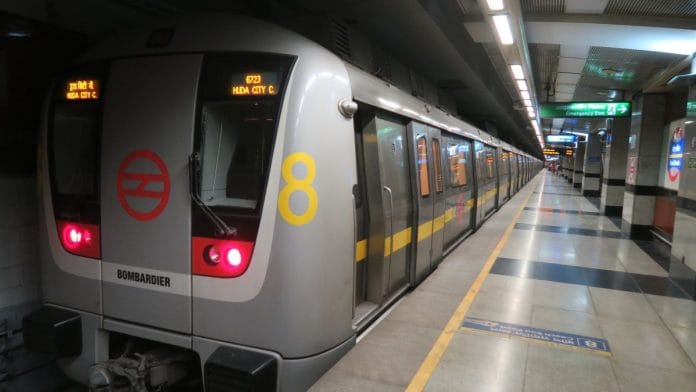New Delhi: The Delhi Metro Rail Corporation (DMRC) is planning to provide a door-to-door mobility solution to its customers to tackle last-mile connectivity issues, ThePrint has learnt. This is a first-of-its-kind initiative. Once the new feature is launched later this week, commuters can book an auto rickshaw or bike for pickup and drop-off services while purchasing a metro ticket through Delhi Metro’s mobile app, Momentum 2.0.
To enhance first and last-mile connectivity, Delhi Metro has partnered with Rapido.
Once a commuter selects the door-to-door service, the app will recommend the nearest metro stations at both ends of the journey and suggest the most suitable mode of transport—bike or auto—for seamless connectivity. “The app will automatically book a bike or auto for pickup from the origin to the nearest metro station. Just before the commuter reaches their destination metro station, another ride will be booked for last-mile connectivity,” a DMRC official, who wished not to be named, told ThePrint.
If a passenger’s origin and destination are within walking distance of the nearest metro station, it will not suggest first and last-mile booking options.
The pickup from the destination metro station will be booked based on the estimated travel time for the entire journey. However, this will not account for road congestion or metro delays while booking the auto/bike to the destination, sources say.
“The bookings are done based on the estimated travel time of the journey. A commuter’s movement will not be tracked during this process,” said the official.
The new feature in Metro’s ticketing app is aimed at providing seamless travel options to commuters and will also help DMRC utilise travel data for route optimisation, train schedule management, and other improvements.
While DMRC’s daily ridership has increased over the past few years—reaching nearly 71 lakh daily passenger journeys in February this year—initiatives like this are likely to further boost Metro usage.
While Delhi Metro has become the transport lifeline of Delhi and the National Capital Region, convenient and affordable last-mile connectivity continues to be a major challenge for commuters. Transport experts highlight the need to integrate all modes of travel with the Metro in cities and ensure that first and last-mile connectivity services are affordable.
E. Madhu, chief scientist at the Transport Planning and Environment Division of the CSIR-Central Road Research Institute (CSIR-CRRI), emphasised that improving first and last-mile connectivity would significantly increase Metro usage. “Many commuters rely on personal vehicles, especially two-wheelers, for daily commutes due to a lack of efficient and affordable last-mile connectivity options,” she told ThePrint.
Citing a 2015 study on sustainable transport conducted by CSIR-CRRI, she said, “We found that Metro users spend over 50 percent of their total travel cost on first and last-mile options. Even today, commuters have to pay a significant amount for last-mile travel. There is a need to find solutions to make last-mile travel more affordable.”
(Edited by Radifah Kabir)






